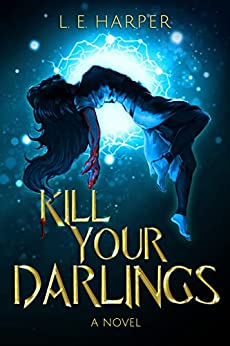Kill Your Darlings received a 4+ star review, making it an IndieReader Approved title.
Following find an interview with author L.E. Harper.
What is the name of the book and when was it published?
My adult fantasy novel, Kill Your Darlings, will be published May 24th, 2023.
What’s the book’s first line?
“Oblivion is a funny thing. It’s human instinct to fear the proverbial abyss, but now that I’m here, it’s not so bad.”
What’s the book about? Give us the “pitch”.
Depressed fantasy author Kyla writes a dark ending to her story, killing her beloved characters. When she wakes one day and finds herself magically trapped in her imagined world, she must fight to change the fatal finale. Trading her pen for a sword, she sets out to defeat the insidious villain who feeds on blood and dreams—but if Kyla can’t overcome her own inner darkness, she’ll die with her darlings.
What inspired you to write the book? A particular person? An event?
Kill Your Darlings is an allegorical tale based on my journey through—and survival of—severe depression. I’ve struggled with my mental health for years, but, perhaps not surprisingly, it took a nosedive in 2020. The pandemic coincided with several personal tragedies that left me feeling broken and hopeless.
Since writing has always been my emotional outlet, I began working on this book in November 2020 for National Novel Writing Month. Telling the story to myself was a much-needed catharsis. It reinvigorated me and inspired me to share my book with the world. I figured if the words I’d written helped me, they could help someone else, too.
What’s the main reason someone should really read this book?
While Kill Your Darlings touches on dark themes, its message is ultimately one of hope. To quote a passage from the book, “Although the darkness may be infinite, it is weak—because even the smallest light has the power to shine through it.” I began writing this book as a love letter to myself, at a time when I felt no one else in the world loved me; but I honed it, revised it, and edited it, hoping it could serve as a love letter to the people out there who’ve suffered as I have suffered. I want to remind those people that we are more than the sum of our mistakes, and it’s never too late to change things.
What’s the most distinctive thing about the main character? Who-real or fictional-would you say the character reminds you of?
My narrator (whose real name is never revealed, and whose appearance is never described) oozes grim, self-deprecating humor. She has a dark outlook on life, the world, and humanity—which I think most of us can relate to, at this point—but deep down she has a great amount of love in her heart, and she just wants to be seen and accepted. Obviously, she’s based on me. Every character I write represents a part of who I am, but in all my years of storytelling, this narrator is the one who most resembles me.
Is this the first book you’ve written?
I’ve written several Young Adult fantasy books under my legal name, but this is my first foray into Adult fantasy. As such, I thought it best to separate the two genres, since Kill Your Darlings deals with darker themes and topics. While the book might appeal to teen readers, especially those in the LGBTQIA+ community—many of whom struggle with their mental health—I didn’t want my original audience to see this and buy it just because they’re fans of my writing, without knowing what it was about.
Would you go traditional if a publisher came calling? If so, why?
That’s a difficult question to answer. If you’d asked me three years ago, I’d have said I would love to be traditionally published. However, after querying Kill your Darlings for fourteen months, racking up more than 200 rejections, and catching a glimpse of the ugly truth behind the curtain of trad pub, I think my answer now is “no.”
The publishing industry has never been kind to marginalized authors and #ownvoices work, and I experienced a lot of discrimination during my journey. A few agents said the quiet parts loud in their rejections. One told me asexual representation wasn’t marketable; another said the book would be “a very tough sell for traditional publishers” because of my mental health rep. Since I am neither interested (nor, apparently, capable) of hiding my identity to make my work commercially viable, I no longer believe traditional publishing would be a good fit for me, or for the stories I want to tell.

